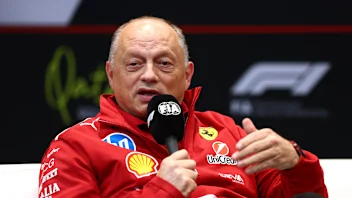All-American heroes - a brief history of home-grown success in the USA
This weekend in Austin, Marussia driver Alexander Rossi will compete in his first home race. Any driver looks forward to wowing an expectant home crowd, but what makes Rossi’s debut more momentous is that he will be the first American to compete in a United States Grand Prix since Scott Speed in 2007. Before Rossi takes to the track, we take a look back and discover how American Formula One drivers have fared on US soil…
Although the United States has produced two Formula One champions - Phil Hill and Mario Andretti - only three other Americans have won a Grand Prix and just one - Andretti - has ever clinched victory in a race on home soil. In 1977 Andretti, an Italian-born immigrant, won the United States Grand Prix West in Long Beach from second on the grid for Lotus. The victory - the third of his F1 career - cemented Andretti’s growing F1 reputation and he went on to triumph in a further three races that year, ending the season third in the drivers’ championship.
Andretti’s home victory had been a long time coming. The Pennsylvania native had a history of poor results at US Grands Prix and up until ‘77 his best result had been a sixth place for Ferrari in 1972. His first home event was in 1968 at the celebrated Watkins Glen circuit in New York State. He secured pole position for what was effectively his first F1 start, but was forced to retire from the race with clutch problems.
This inauspicious start would set the tone for further lost opportunities on home soil for the driver - a failed start (1971), disqualification (1974), and four retirements (1969, 1975, 1976 - both the west coast and east coast race). Even in 1978, the year he would clinch the world championship, Andretti was unable to repeat the success of the previous season following engine problems. However, he had at least mustered second place at Long Beach earlier in the year.
The United States’ first world champion, Phil Hill, took a career total of three Grand Prix wins, but victory in a home race would remain an unfulfilled ambition for the Californian. Hill seemed to be plagued by bad luck when he raced in America and despite competing in five US Grands Prix, he was forced to retire three times in 1959, 1963 and 1964, and failed to start the race in 1962. In fact Hill’s best position in America was in 1960 when he managed sixth place.
In 1961, the year he became world champion, Hill pulled out of the US Grand Prix following the death of his Ferrari team mate Wolfgang von Trips in the previous round at Monza. However Hill’s withdrawal didn’t completely rule out the Americans, as New Yorker Dan Gurney climbed from seventh on the grid to take second place in his Porsche. Gurney managed another US podium in 1965, taking second place again from eighth on the grid.
Ritchie Ginther was another American driver who almost clinched victory in his home race in 1963, but the Californian - who grew up in the same town as Hill - also had to settle for second place at Watkins Glen.
In the 1970s and ‘80s, Phoenix-born Eddie Cheever entered 143 Grands Prix, including 14 races in America. Cheever never won a home race, but he did make the podium in 1982, when he was second in Detroit and third in Las Vegas. Then again in 1989, he came third behind Riccardo Patrese and race winner Alain Prost.
Prior to Rossi this weekend, the last American to compete in a US Grand Prix was the aptly named Scott Speed. The man from San Jose qualified his Toro Rosso a confident 13th at Indianapolis in 2006, only to be eliminated in a first-lap pile-up, while the following year he finished 13th having started 20th.
All in all, Formula One success for American drivers on home soil seems to be a hard-won rarity. Several drivers have come close to victory, but Mario Andretti remains the last - and only - American to have lifted the winner’s trophy following a Grand Prix in the USA. It’s unlikely to happen this weekend, but Alexander Rossi will be hoping that one day he’s the next.
Next Up
Related Articles
 Norris collects World Championship trophy at FIA Awards
Norris collects World Championship trophy at FIA Awards.webp) VOTE: Choose your favourite race of the 2025 season
VOTE: Choose your favourite race of the 2025 season 10 ways to get your Formula 1 fix during the winter break
10 ways to get your Formula 1 fix during the winter break JacquesHow did the rookies do in their first F1 season?
JacquesHow did the rookies do in their first F1 season? 3 inspiring individuals share their paths to working in F1
3 inspiring individuals share their paths to working in F1 Abu Dhabi 'not a bad weekend' for Ferrari – Vasseur
Abu Dhabi 'not a bad weekend' for Ferrari – Vasseur